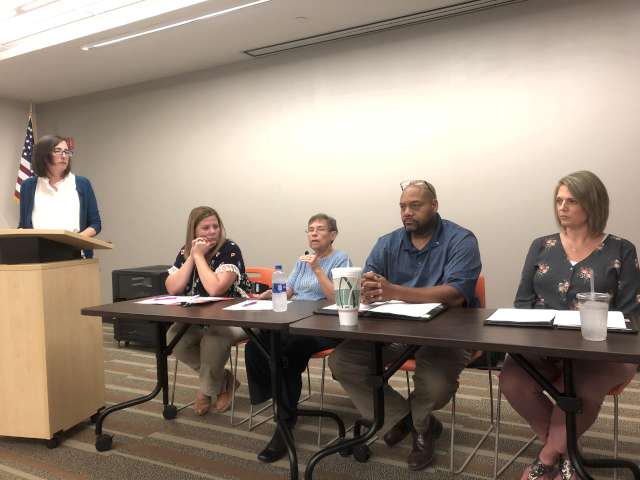Homelessness a Problem in the Effingham Community
Published on September 30 2019 7:41 pm
Last Updated on September 30 2019 8:11 pm
Written by Greg Sapp
We might see people sitting at an intersection with their sign asking for some assistance, but our awareness of homelessness in the Effingham community might go no further than that.
But there's a much greater need, and it involves people who live here, even if they don't have a residence they can call their own.
A panel discussion Monday evening at Effingham Public Library highlighted the need for more homes for those who are homeless, shelters for those who are working to rebuild their lives, and resources to help them along the way.
The panelists were Tyrone Harvey with the Family Life Center, Outreach Director Cindy Mayer with CEFS, Sister Carol Beckermann with Catholic Charities, and Angela Reeter, Area 5 Lead Homeless Liaison with the Regional Office of Education serving Effingham County and other area counties.

(FROM LEFT, LIBRARY DIRECTOR AMANDA McKAY, CINDY MAYER OF C-E-F-S, SISTER CAROL BECKERMANN OF CATHOLIC CHARITIES, TYRONE HARVEY WITH FAMILY LIFE CENTER, AND ANGELA REETER OF THE REGIONAL OFFICE OF EDUCATION)
Library Director Amanda McKay moderated the discussion. We asked her why the library wanted to discuss homelessness.
McKay said homeless people utilize the library for resources, just like any other library patron. Awareness of their needs led to an effort to see how those needs can be met.
McKay agreed, though, that for some area residents there needs to be some awareness raised that homelessness exists in the community.
The panelists shared that some of the causes of homelessness include lack of transportation, no shelters, drug use, ill health, living paycheck to paycheck since that limits any effort to get ahead and then something goes wrong, poverty, past incarcerations, lack of job skills, elder abuse, lack of financial management skills, and a lack of low income housing.
Reeter noted a statistic showing that there are 35 affordable housing units for every 100 people of low income status.
McKay asked the panelists what they most need? Without any condescension, they agreed that the greatest need is a home. Expanding on that, the panelists said even a temporary shelter would get that biggest need addressed so they could work on getting cleaned up for a job interview or get their kids ready for school, or other needs met. Stability was a word heard.
Another basic question asked is where does the dialogue go from here? We will try to keep you up to speed on that, but interaction with governmental entities, from townships on up, was urged to shine a spotlight on the problem of homelessness.













